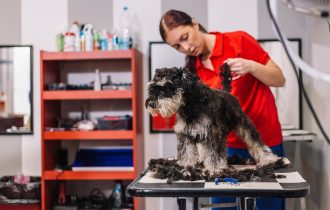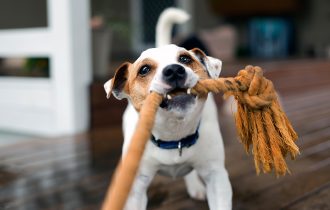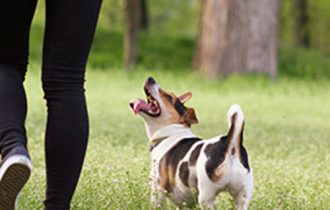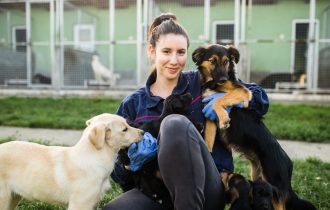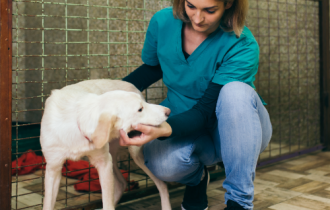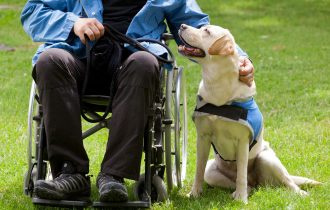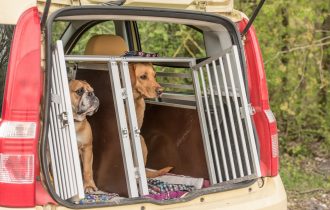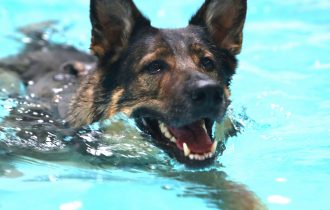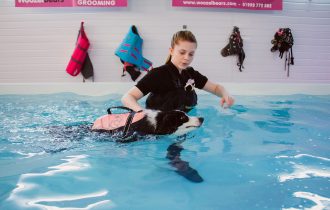Dogs are highly social animals. Many cultures consider dogs to be a member of the family or a man’s best friend. There are many different careers and job opportunities that allow people to work directly with dogs. For a career with dogs, please ensure you gain relevant training before applying for vacancies.
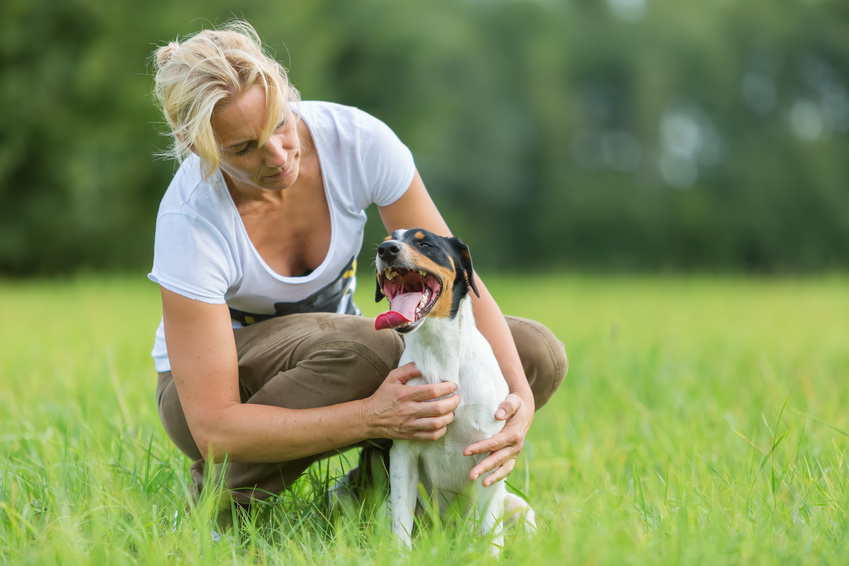
Want a career working with dogs? Scroll down for more information on a variety of roles in dog care and welfare and discover a job of your dreams.
Career with Dogs
-
Dog Walker / Pet Sitter / Pet Boarder
View Recommended TrainingWhat is a Dog Walker?
A Dog Walker is someone who walks dogs for a living. Usually, Dog Walkers offer walks of between 30 minutes and one hour, and most take several dogs on each walk.Professional dog walking services are increasingly in demand in the UK, particularly in urban areas where dogs can be confined to small properties and left on their own while their owners are at work all day.
All healthy dogs need to be walked every day, sometimes more than once (some high energy dogs can require 2-4 walks per day, although it is important to remember that mental stimulation is just as important as physical exercise). In some circumstances this is impossible for owners to achieve due to work commitments, health issues or holidays. In these cases, owners may choose to employ the services of a Dog Walker.
How does being walked benefit dogs?
Dogs benefit from the regular routine that Dog Walking can provide. They are sociable animals who enjoy the company of others and should not be left on their own for more than 4 hours at a time. Employing a Dog Walker can positively impact on a dog’s physical and emotional health. Regular exercise not only keeps dogs physically healthy but also alleviates stress and prevents boredom and behavioural problems.Walking maintains a dog’s physical health by:
- Keeping joints and muscles moving.
- Keeping weight controlled.
- Supporting a healthy digestive system.
Walking maintains a dog’s mental health by:
- Engaging senses of sights, scents, and sounds.
- Providing opportunities for socialisation.
- Improving cognitive and behavioural development.
- Improving wellbeing and confidence.
Where do Dog Walkers work?
Dog Walkers work predominantly outside in all types of weather and terrain. However, they also need a space to complete admin and arrange bookings and will often complete home visits to meet clients and their dogs. Some Dog Walkers have use of a large vehicle and will spend time transporting dogs to a walking site and home again.
What soft skills do you need to become a Dog Walker?
To consider a career as a Dog Walker, several soft skills are required to become successful. Dog Walkers must genuinely like dogs and have a desire to promote their welfare. It will benefit your career to have the following skills:- Be physically fit.
- Be responsible.
- Be quick-thinking.
- Be happy and comfortable in all weathers.
- Have experience with dogs.
- Enjoy exercise.
- Good time management.
- Be organised.
- Familiar with canine behaviour.
- Good communication and customer care skills.
How much does a Dog Walker earn?
The average cost of a dog walk in the UK is between £10-£24 per hour, per dog. This can vary depending on where you are based, your skill and experience level and whether the dog has specific needs or requirements.In the UK, professional Dog Walkers have the potential to earn around £26,500 per year based on a dog walker who walks around 13 dogs per day for five days each week.
Some Dog Walkers choose to offer additional services, such as Animal Boarding or Grooming, which can increase your earning potential and enhance your business.
How do you become a qualified Dog Walker?
Currently, there is no obligation to complete official training to become a Dog Walker in the UK. However, if you are Dog Sitting or taking care of a dog within your own home or business then you will need to obtain a Level 2 or a Level 3 qualification to meet the Defra Animal Activity Licensing Requirements.Completing a relevant course or qualification will demonstrate to owners that you have the necessary knowledge to take good care of their dogs. Becoming qualified in Dog Walking, Canine Behaviour, Pet Sitting or Canine Care will help to give you an advantage in the increasingly popular career choice of Dog Walking. Achieving the appropriate qualification will also ensure that you meet the Defra Animal Activity Licensing Requirements.
A good place to start and get some basic essential skills in Dog Walking would be with a short online course such as the Dog Walking Certificate. Gaining this certificate will provide reassurance to clients and provide you with valuable knowledge for developing a successful Dog Walking Business.
If you choose to enhance your Dog Walking Business by offering additional services such as Pet Sitting, Boarding or Grooming then you will need to obtain a Level 2 or Level 3 Ofqual regulated qualification that meets the standards of the Animal Activity Licensing Regulations.
The Level 4 Certificate in Professional Pet Sitting, Dog Walking, Dog Day Care and Boarding is suitable for those who want to operate a Dog Walking or Pet Sitting Business. This qualification complies with the Defra Animal Activity Licensing Requirements for working as a Pet Sitter. Achieving this qualification will ensure that you are aware of the responsibilities, legislation and legal requirements necessary to carry out Dog Walking or Pet Sitting. It will also provide you with useful canine behaviour and psychology knowledge that will improve the service that you offer.
For all related courses, training and qualification please visit the relevant course pages.
Where can I get a job as a Dog Walker?
Once you have qualified as a Dog Walker you may choose to become self-employed and set up your own business.Many Dog Walkers start small and advertise their service locally before building up a customer base. If you choose to become self-employed, it’s a good idea to advertise your services at your local veterinary surgery and pet shops. Providing a service that exceeds customer expectations will ensure that you get positive reviews. Word of mouth endorsement is vital for a small business.
It’s also worth keeping your eye on local ‘wanted’ advertisements as owners may post details when they’re looking for the services of a local Dog Walker.
Registering with our Animal Job Board will give you access to the latest vacancies around the world.
Book a call with one of our career advisors and they will take you through training and career options within the animal industry.
-
Dog Groomer / Pet Groomer
View Recommended TrainingWhat is Dog Grooming?
The main job of a Dog Groomer is to maintain the condition of dogs’ coats through bathing, clipping and trimming. Grooming can also include cleaning dogs’ ears, trimming nails, brushing, blow-drying, and styling coats.
All dog breeds will require some form of grooming – the basics of which can often be taken care of by the owner at home. However, most dogs will benefit from receiving a full professional groom from time to time and for some breeds, it’s important to attend regular grooming appointments to maintain their wellbeing.
Many owners don’t have the time, expertise, skills or facilities to bathe, groom and clip their dog, which is why professional grooming services are so important.
What does a typical day as a Dog Groomer look like?
Working in a Dog Grooming Salon involves more than the day to day grooming of pets – the work also includes:
- Customer care.
- Working within health and safety requirements and legislation.
- Knowledge of canine anatomy, first aid, welfare, and health issues.
- Equipment maintenance.
- Assessing and planning styling requirements.
- Understanding breed standard styling techniques.
- Confidence in canine handling
- Understanding how dogs communicate.
A day in the life of a Dog Groomer will often start with meeting customers and discussing their wishes for their dog. Knowledge of dog breeds will help you to advise them on the best finish for their pet. Being able to read the dog’s body language to assess how nervous or relaxed they feel is an important skill and will dictate how you work with them. After the grooming process is complete, the equipment will need to be cleaned and any waste from the session taken care of before moving on to the next customer.
Why is Grooming beneficial for Dogs?
Grooming plays an important part in keeping dogs healthy and happy. Regular brushing encourages healthy skin and good hair growth. It stimulates the blood supply to the skin, removes dead hair and dirt and prevents matting.
Grooming not only helps dogs to look good but also helps to keep them healthy. A well-groomed dog will benefit from:
- Being clean and comfortable.
- Clear vision (free from long hair over the eyes).
- Being free of matted hair.
- Being free from painful, overgrown nails.
- Detection and removal of grass seeds (which can lead to abscess and infection).
- Detection of fleas, ticks, and mites.
- Reduced risk of eye, ear, skin, teeth, and nail infection.
- Easier vet check-ups (Dogs get used to handling).
- Lower veterinary bills (catch health concerns before an emergency).
Where do Dog Groomers work?
Dog Groomers often work in pet grooming salons. These can either be inappropriately fitted retail premises or a mobile unit. Dog Groomers can also be based in animal rescue centres, dog day-care centres, pet shops, boarding kennels, veterinary practices, and animal hospitals. Some Dog Groomers choose to work as home groomers or offer pet grooming services where they travel to the pet owners’ homes.
What soft skills do you need to become a Dog Groomer?
To consider a career as a Dog Groomer, several soft skills are required to become successful. The following will be useful:
- Manual dexterity with good hand to eye coordination.
- Eye for detail.
- Dog handling and control techniques.
- Physical fitness (lifting, and moving dogs).
- Being patient, calm and gentle.
- A love of working with animals.
- An understanding of dog behaviour.
- An interest in learning about hair cutting and styling techniques.
- Enjoying working with the public.
- Good communication and customer care skills.
- Being able to cope with animals in distress.
- Being prepared to get dirty.
- Able to deal with unpleasant tasks such as ticks, fleas, lice, and severe matting.
How much does a Dog Groomer earn?
Dog Groomers usually earn around £13,000 as a starting salary and with experience, this can increase to £20,000. You can choose to either work in a salon or become self-employed. As a self-employed Dog Groomer, you can choose to set your prices. In the UK, Dog Groomers charge around £20-30 on average for each treatment. In some areas, prices can be up to £80.
How do you become a qualified Dog Groomer?
Working as a Dog Groomer does not currently require specific qualifications. However, achieving a recognised qualification will certainly improve your employment prospects in this increasingly popular career choice.
A good place to start to gain basic knowledge and an understanding of the role would be to study the Level 3 Award in an Introduction to Dog Grooming. This Ofqual regulated qualification allows you to complete the theory elements online and includes 2 days of hands-on practical training working alongside trained and highly experienced Dog Grooming professionals. The Award covers all the basics to get you started including Health and Safety in a Dog Grooming Environment and how to Prepare, Style, and Finish a range of Dog Breeds.
If you would like a more in-depth study into styling, dog welfare and handling then the Level 3 Certificate in Dog Grooming and Introduction to Styling might be a better fit. This Ofqual regulated qualification includes 10 days of practical training with the opportunity to practice grooming and styling techniques on several dog clients with a range of coats styles and lengths.
How can you become a Dog Grooming Salon Manager?
If you have experience in Dog Grooming and would like to progress your career to becoming a salon manager, then consider a more comprehensive qualification such as the Level 3 Diploma in Dog Grooming. This Ofqual regulated qualification provides an in-depth look at the core responsibilities of a salon manager and how to run your own Dog Grooming business. The qualification also includes a valuable training opportunity with 25 days of practical experience at a professional Dog Grooming school.
For all related courses, training and qualification please visit our website.
Where can I get a job as a Dog Groomer?
The demand for professional Pet Groomers is increasing as more people choose to have pets and there is a growing awareness about responsible pet ownership. Career opportunities are numerous in this type of animal care and a good Dog Groomer should not have many problems finding employment.
You can contact Dog Grooming Salons near where you live with your CV, or alternatively, set up your own Small Animal Business in your hometown.
Once you have completed your qualifications you can seek employment by registering with our Animal Job Board for the latest vacancies around the world.
Book a call with one of our career advisors and they will take you through training and career options within the animal industry.
-
Dog Behaviourists / Canine Behaviourists
View Recommended TrainingWhat is a Canine Behaviourist?
Canine Behaviourists can also be known as Dog Behaviourists. Their main role is to diagnose and treat behavioural problems in dogs. Canine Behaviourists use their skills to help resolve emotional problems (such as anxiety, phobias, and fear) in dogs.The work involves meeting with owners and their dogs to:
- Discuss problems.
- Assess issues (by observing and handling dogs).
- Develop treatment programmes.
Once the emotional components that the dog is experiencing are understood, the Canine Behaviourist can devise a behaviour modification plan according to the dog’s specific needs, which the owners can follow, leading to more positive behaviour from their dog.
How does working with a Canine Behaviourist benefit dogs?
Dogs who feel unsettled may go on to become distressed or act in dangerous ways. This manifests in several ways and can be seen in behaviours such as:- Anxiety around loud or unexpected noises.
- Panicking if left alone.
- Causing damage to themselves or the environment they’re in.
- Displaying aggression to people or animals around them.
- Traffic chasing.
Often, owners find that these kinds of behavioural problems can’t be resolved through simple training exercises. A form of emotional distress is often at the heart of the dog’s behaviour and seeking help from a Canine Behaviourist will help to restore emotional equilibrium to the dog which, in turn, will help to resolve the manifesting behavioural issues.
The benefits to the dog are huge. Canine Behaviourist can teach owners how to resolve emotional distress in their pets which will result in the dog feeling calmer and able to engage in more positive behaviours.
Where do Canine Behaviourists work?
The working environment of Canine Behaviourists will vary. Much of the work involves meeting with dogs and their owners at either a clinic, the owner’s home or an outside location. Some of the work may also involve facilitating dog behavioural classes. Along with the in-person consultation time, Canine Behaviourists also need office space to write reports and formulate action plans.Although there are Canine Behaviourist positions at some clinics and rescue centres, many Canine Behaviourists are self-employed.
What soft skills do you need to become a Canine Behaviourist?
To consider a career as a Canine Behaviourist, several soft skills are required to become successful. Canine Behaviourists must genuinely care for and have an affinity with dogs. It will benefit your career to have the following skills:- Enjoy working with people and animals.
- Be an effective communicator.
- Be patient and compassionate.
- Good attention to detail.
- Good at working on your own.
- Ability to be calm in stressful situations.
- Good analytical skills.
How much does a Canine Behaviourist earn?
Salaries vary according to employer and region and are dependent on experience. Most behaviourists are self-employed, running their own businesses and charging according to their experience – this may be up to £30 per hour in some parts of London. The average salary in the UK 2019 for Animal Behaviourists was £30,378. Though, there is potential for this to be much higher with experience.
How do you become a qualified Canine Behaviourist?
To work as a Clinical Canine Behaviourist you will need a relevant qualification at degree level (level 6) or higher.There are several qualification choices that will help you on your Canine Behaviourist career path depending on your current skill and qualification level. If you’re looking for an introductory qualification that will introduce you to the basics of canine behaviour then either the Level 2 Award in Canine Care and Welfare or Level 3 Award in Canine Care, Behaviour and Welfare are good options.
Following these qualifications, you can progress onto the Level 3 Diploma in Canine Care, Behaviour and Welfare. This qualification is the perfect foundation for careers involving canine behaviour and has been developed in collaboration with canine care sector employers.
If you’re aged 18 and over and have achieved a relevant level 3 qualification then the Level 4 Diploma in Canine Welfare, Training and Behaviour is the next step. This leads on to the Level 5 Diploma Canine Behaviour Practitioner qualification.
Successful completion of the Level 5 qualification will ensure acceptance onto the Level 6 Diploma in Applied Canine Behaviour Management (equivalent to a degree with honours). This is the Ofqual approved Level 6 qualification for working as a qualified Canine Behaviourist. The qualification meets the Defra Higher Standard Animal Activities Licensing (AAL) requirements.
There is the option of studying levels 3-6 as a combined qualification if that suits your needs better. The Combined Canine Behaviour Management Diplomas Ofqual Levels 3, 4, 5 and 6 qualification package is equivalent to a degree level qualification and is a suitable choice to qualify as a Canine Behaviourist.
For all related courses, training and qualification please visit the relevant course pages.
Professional Membership Organisations
It is helpful to join a widely recognised professional membership organisation such as the Association of INTODogs, International Companion Animal Network (ICAN) or the Pet Professional Guild.
Joining a well regarded professional membership organisation will result in higher referrals as professionals such as vets seek to refer with confidence.
The International Companion Animal Network (ICAN) was founded by a group of prominent organisations and education providers who use and recommend only force free methods. We founded to meet the profound need for solidarity, mutual support, communication and cooperation between professionals working in the animal behaviour and training realm.
Where can I get a job as a Canine Behaviourist?
Once you have qualified as a Dog Behaviourist you may choose to become self-employed and set up your own business. You will receive requests for your service through referrals from veterinary surgeries, charities and individual owners. If you choose to become self-employed, it’s a good idea to advertise your services at your local veterinary surgery.Occasionally some of the animal welfare organisations and veterinary teaching hospitals have full and part-time vacancies for Clinical Animal Behaviourists. Some larger animal rescue centres employ their own Behaviourists.
Registering with our Animal Job Board will give you access to the latest vacancies around the world.
Book a call with one of our career advisors and they will take you through training and career options within the animal industry.
-
Canine Hydrotherapist and Small Animal Hydrotherapist Careers
View Recommended TrainingThis rewarding career involves assisting dogs and other animals who are recovering from injury or chronic conditions. The Level 3 Diploma in Hydrotherapy for Small Animals is a recognised qualification for this type of career. It involves theory and practical training.
Check this out and our entire suite of animal therapy qualifications on our website.
-
Dog Transport / Pet Taxi Businesses and Canine Transportation Manager
View Recommended TrainingThis is a growing industry and a rewarding career if you enjoy driving, are happy working flexible hours and would like to run your own pet related business. The Principles of Animal Transportation Certificate Course or the more advanced Level 3 Award in Companion Animal Transportation should be considered for this career.
-
Assistance Dog Trainers
View Recommended TrainingAssistance Dog Trainers train dogs to assist people with hearing or sight difficulties, physical disabilities, and those prone to seizures, to lead independent lives. If you want a rewarding career with dogs and people this would be a good career opportunity and The Level 3 Diploma in Assistance Dog Training is the recommended Ofqual regulated qualification to become a qualified Assistance Dog Trainer.
There are six types of assistance dogs:
- Diabetes Hypo-alert Dogs are trained to identify and alert when their owner’s blood sugar drops to a level that results in a hypoglycaemic episode
- Cancer Detection Dogs are trained to identify cancer and disease
- Guide Dogs for the Blind and visually impaired
- Hearing Dogs alert severely and profoundly deaf people to routine sounds
- Disability dogs carry out tasks such as pushing the emergency button on a telephone and opening and closing doors
- Seizure alert dogs recognise seizure signs in their owner and thereby prevent a seizure from occurring
-
Animal Licensing Inspector / Animal Welfare Officer / Dog Warden
View Recommended TrainingWhat is a Dog Warden / Animal Licensing Inspector?
Each local authority in the UK is required to employ someone responsible for the collection of stray dogs. Dog Warden is the title usually used for this position but they can also be known as Animal Wardens, Dog Control Officers and Animal Welfare Officers. The remit of an Animal Welfare Officer is wider and it is to assist all animals in need, be proactive in the prevention of animal cruelty, and provide practical animal care advice and assistance to the general public about responsible pet ownership.Animal Licensing Inspectors are responsible for the licensing of animal related premises according to the Defra licensing requirements. Local Authority Animal Licensing Inspectors work for Councils inspecting and licensing any business involving animals. This includes the licensing of any business involved in the sale and care of animals including Dog Boarding Kennels, Catteries, Day Care for Dogs, Home Boarding Dogs, Dog Breeding and Selling Animals as pets.
What does their work include?
Work as a Dog Warden or Animal Licensing Inspector can include:- Investigating claims of neglect or reported cruelty.
- Providing practical animal care advice.
- Collecting evidence of neglect or cruelty & presenting evidence in court.
- Removing animals from harmful situations.
- Animal rescue work.
- Visiting and checking sites or establishments where animals are kept (such as farms, pet shops and markets).
- Following up calls about lost/stray or suffering animals.
- Giving presentations and talks to schools and other organisations about animal welfare issues.
Where do Dog Wardens / Animal Licensing Inspectors work?
Many local authorities and animal welfare charities, such as the RSPCA, now employ Animal Welfare Officers. In local authorities, the work of an Animal Welfare Officer and an Animal Licensing Inspector is often combined. Due to the nature of the work, Animal Welfare Officers are required to attend various premises and locations which means that they work outdoors in all types of weather and may spend a lot of time travelling between jobs.
What soft skills do you need to become a Dog Warden / Animal Licensing Inspector?
To consider a career as a Dog Warden or Animal Licensing Inspector, several soft skills are required to become successful.- Excellent people skills.
- Compassion.
- Care about animal welfare.
- Experience in working with animals.
- Physical fitness and being able to swim 50 meters fully clothed.
- Being able to remain calm in emergencies.
Candidates who process these skills will be well placed to excel in the role and will have the opportunity to work actively in preventing and alleviating cruelty towards animals.
How much does a Dog Warden / Animal Licensing Inspector earn?
Salaries vary according to employer and region and are dependent on experience. On average, salaries start from around £14,000 and progress up to £30,000.
How do you become a qualified Dog Warden / Animal Licensing Inspector?
All Animal Welfare Officers and Animal Licensing Inspectors must be suitably qualified. Whether you’re planning to work for a local authority or an animal charity, you need to be familiar with the welfare needs of companion animals and have a thorough understanding of current animal welfare legislation.To apply for Animal Licensing Inspector positions you will need a qualification such as the Level 3 Award for Animal Licensing Inspectors that meets the Defra licensing requirements. This is the quickest way to gain an Ofqual regulated qualification that is designed specifically for those responsible for the licensing of animal related premises.
The qualification will teach you how to conduct an inspection of premises where companion animals are kept and how to provide advice regarding animal welfare and accommodation improvements. On completion of the qualification, learners will know the legal requirements relevant to the sector. Achieving this qualification will ensure that you are well placed to apply for a role as an Animal Licensing Inspector and will mean that you and the work that you do will benefit the welfare of animals in various animal related businesses.
Alternatively, if you’re looking for a more in depth qualification that will prepare you for the varied work of an Animal Welfare Officer then the Ofqual regulated Level 3 Diploma Animal Welfare Officer is a suitable choice. The qualification will provide you with the knowledge needed to work confidently as an Animal Welfare Officer and combines the learning required for Animal Licensing Inspectors. This comprehensive qualification contains information about understanding, recognising and responding to animal cruelty. The content prepares learners for a role as an Animal Welfare Officer by providing knowledge about:
- Welfare & care requirements for a variety of companion animals.
- Inspecting sites.
- Animal hoarding.
- Animal welfare issues & legislation.
- Animal first aid.
- Animal handling & transportation.
- Record & equipment keeping.
- Stray animal management.
- Advising the public about responsible pet ownership.
Achieving the Level 3 Diploma Animal Welfare Officer qualification will mean that you are well placed to apply for roles as an Animal Welfare Officer either with a local authority or with an animal charity. The qualification is a suitable choice for those wishing to apply for RSPCA Inspector positions and meets the Animal Activity Licensing (AAL) Regulations Higher Standard requirements.
For all related courses, training and qualification please visit the relevant course pages.
What does it mean to be ‘A Suitably Qualified Person’?
Job descriptions for Animal Welfare Officer and Animals Licensing Inspector positions will often state that the candidate needs to be ‘suitably qualified’.The Department for Environment, Food and Rural Affairs (Defra) has issued procedural guidance notes for local authorities required to license activities involving animals and the relevant establishments. The guidance for suitably qualified Inspectors states:
“All inspectors must be suitably qualified. This is defined as:
(a) Any person holding a Level 3 certificate or equivalent granted by a body, recognised and regulated by the Office of Qualifications and Examinations Regulation which oversees the training and assessment of persons in inspecting and licensing animal activities businesses, confirming the passing of an independent examination. A person is only considered to be qualified to inspect a particular type of activity if their certificate applies to that activity. Or;
(b) Any person holding a formal veterinary qualification, as recognised by the Royal College of Veterinary Surgeons (“RCVS”), together with a relevant RCVS. continuing professional development record;
(c) Until October 2021, any person that can show evidence of at least one year of experience in licensing and inspecting animal activities businesses.”
Where can I get a job as a Dog Warden / Animal Licensing Inspector?
Vacancies are normally advertised directly by local authorities and charities. It can also be worth checking for positions through the National Dog Wardens Association.
Registering with our Animal Job Board will give you access to the latest vacancies around the world and you can contact local authorities and animal charities near where you live with your CV.
Book a call with one of our career advisors and they will take you through training and career options within the animal industry.
-
Pet Sitting and Dog Home Boarding or Pet Sitter
View Recommended TrainingThis is another career with dogs that offers a chance of a good income. Dog Home Boarders are in high demand as more pet owners become aware that boarding their animal can be a traumatic experience. Many people now recognise that employing a Pet Sitter is preferable than boarding kennels.
Confining any animal is never ideal; kennels and catteries can be a frightening and stressful experience for some animals and for others a very boring one. The idea of pet sitting is simply that pets stay in a home environment, either in their own home or with the Pet Sitter, where they receive individual care and are treated like one of the family. Pet sitting is a fast growing industry and for many a thoroughly rewarding and satisfying business opportunity for anyone wanting a career with dogs. Our online Professional Pet Sitting Certificate is relevant for this type of work.
-
Dog Handler and Canine Handler
View Recommended TrainingDog handlers are recruited by the armed forces and private security firms. Before becoming a Dog Handler for the armed forces individuals are required to join the organisation where they intend to work. For example, Police Handlers have to spend two years in ordinary police training before transferring to the dog section. Having relevant experience will ensure you have the best chance of being offered a trainee position.
Our canine care and behaviour qualifications would be an excellent starting point.
-
Dog Trainer
View Recommended TrainingTo achieve a successful dog training career you will need loads of patience, compassion and relevant training.
As the dog training sector is not regulated, anyone can set themselves up as a Dog Trainer. However to gain credibility and in the interest of dog welfare it is advisable for anyone wishing to be a Dog Trainer to gain some sort of recognition by undertaking an accredited dog training or behaviour course. Although there are many training methods and courses available to anyone eager to get started, ranging from videos, books and college courses, we advise you to choose the course carefully: some are good, some not so good and definitely avoid any course that uses punishment as a method of training. If this is suggested then they are not good courses! The dog training procedure should be an enjoyable and stimulating experience for the dog not a punishment.
As well as being useful for a dog training career, training can be useful for other careers with dogs and related jobs with dogs within the animal care industry such as a dog handler. To learn force-free training methods, learners should explore the Level 3 Diploma in Canine Care, Behaviour and Welfare. This qualification will provide the basic skills required as a Dog Trainer. Advanced learners, who already have experience with dogs and hold a Level 3 qualification in Animal Care, can go on and study the higher level Ofqual regulated qualification; Level 4 Diploma in Canine Behaviour and Training Management.
-
Animal Charity Rehoming Manager
View Recommended TrainingAnimal rescue centres are set up by individuals or charitable organisations. Working for an animal charity is very different to the work of a private boarding or breeding organisation and no two animal rescue centres are run in the same way so it is difficult to clearly define the role of an Animal Care Manager in an animal rescue charity.
They vary in just about every way including location, size, layout, facilities, types of animals catered for, policies and ethos. However, one thing they all do is to take in, care for and re-home unwanted animals. If your looking for a rewarding career with dogs working for a dog rescue charity could be for you. The Animal Rehoming course is a relevant course to study if you are interested in this field.
-
Private Boarding Kennels Manager
View Recommended TrainingThe Kennel Manager has the overall responsibility for ensuring that all the daily routines are carried out properly. They may also be required to do some of the physical work in the kennels. Good organisational or management skills and some sort of animal care related qualification some practical experience working with animals is essential.
Training and volunteering experience is preferential for this role. You can gain a relevant Ofqual regulated qualification by studying the Level 3 Diploma in Kennel and Cattery Management.
-
Kennel Managers / Kennel Supervisors
View Recommended TrainingKennel Managers and Supervisors are employed by private boarding establishments and charitable organisations to manage every aspect of the smooth running of the kennels.
You can get qualified for this role by studying our online Diploma in Kennel and Cattery Management.
-
Kennel Assistant
View Recommended TrainingIf you have decided that a career with dogs is for you then working with dogs in kennels is an invaluable experience. Dogs in boarding or welfare kennels are entirely reliant on the kennel staff for cleaning, exercise, grooming, feeding and stimulation.
The importance of dedicated, compassionate and hard-working kennel staff is often underestimated and it is a very much undervalued profession. Having caring people doing this sort of work really makes a difference to the quality of life for the dogs in kennels.
A calm and cheerful disposition is also essential for this type of work as dogs will pick up on and respond to your mood. It is not always understood that most dogs confined to kennels will be experiencing emotional stress many suffer severely as a result of confinement, separation anxiety and lack of stimulation. They will rely on the skills and patience of the kennel staff to alleviate this stress.
Hands-on time, walking and playing with the dogs is the best part of this job, so make sure you get a chance to interact with each dog every day! If you show commitment and work well you could even secure a promotion to Kennel Manager or Supervisor. Training and volunteering experience is preferential for this role. You can gain a relevant Ofqual regulated qualification by studying the Level 3 Diploma in Kennel and Cattery Management or the Level 2 Award in Canine Care and Behaviour.
Relevant Courses
-
Level 3 Diploma in Dog Grooming and Salon Management
-
Principles of Dog Handling
-
Dog Walking Certificate
-
Level 3 Diploma in Kennel and Cattery Management
-
Level 3 Award in Dog Walking and Pet Sitting for Professionals
-
Private: Level 3 Diploma Animal Welfare Officer
-
Level 3 Diploma in Assistance Dog Training
-
Principles of Animal Transportation Certificate
-
Level 3 Diploma in Small Animal Hydrotherapy
-
Level 4 Diploma in Small Animal Hydrotherapy
If you already have relevant training, please visit our Job Board to search for the latest jobs with dogs.
Please get in touch for more information about a career with Dogs. Our experienced careers and training advisers are happy to assist, please contact us on 0208 6269646.



